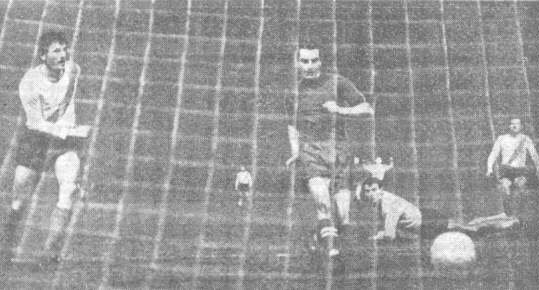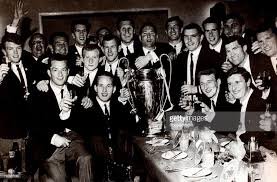Happy Boxing Day/ St Stephen’s Day everybody and Happy 81st Birthday to Mr Stevie Chalmers. Stevie or to give him his full name Thomas Stephen Chalmers signed for Celtic in 1959 and was to play for the Hoops until the start of the 1971/2 season at centre forward, scoring 228 in 393 appearances, the fourth biggest total in the clubs history. For most Celtic fans one of his goals is remembered above all others as Stevie deflected a Bobby Murdoch shot past Inter Milan ‘keeper Sarti to win Celtic the European Cup.
In the 1966/67 season he had been Celtic’s highest goal scorer in the league with 21 but was Celtic’s second highest goal scorer for the season behind Joe McBride. Whilst McBride didn’t feature much in the European Cup run, Chalmers was not only important in the final but produced important goals along the road to Lisbon. He was joint second top goal scorer in the competition. In the first round he scored once in the away leg in Switzerland in a convincing 3-0 win over Zurich. In the second round he scored in both home and away legs against French Champions, Nantes, as Celtic ran out 6-2 winners on aggregate. The quarter final probably proved to be one of the most taxing games on the way to Lisbon and offered up the only game in which Celtic failed to win losing 1-0 away from home against Yugoslav champions, Vojvodina. Chalmers, however, scored in the return home leg before a last minute Billy McNeill goal dramatically clinched progression for Celtic. In the second leg of the semi-final against Dukla Prague, Celtic, despite the players claiming that they had not intended to do so, played very defensively, leaving Chalmers with the hard job of being the sole offensive player, an out for his teammates to relieve the Dukla pressure. A scoreless draw was their collective reward and a place in the European Cup Final was assured.
In terms of individual acclaim it was on January 3rd 1966, that Chalmers produced a record that was not to fall until the arrival of Moussa Dembélé at Celtic Park. An Old Firm League hat trick and as the Sky commentators remarked during the 5-1 game this season, “Every Old Firm hat trick is perfect”. On that day at Parkhead, Celtic ran also ran out 5-1 winners, with Chalmers’ being arguably even more impressive as all three of his strikes came in the second half. It proved to have been a key battle in the season which saw Celtic win the first of their nine titles in a row.
It could have all been so different when as a young man playing for Kirkintilloch Rob Roy he fell extremely ill with tuberculosis meningitis. As he lay in his hospital bed he saw lifeless bodies around him on almost a daily basis, Chalmers himself said of the ordeal that at first he was “impatient to be released from that old hospital,[but] it soon got to the stage where I was happy simply to be alive.” Years later he received a message of support from his old Doctor from his time in hospital, one Mr McKenzie, wishing him well in the Scottish Cup Semi-Final of 1960 despite the fact that McKenzie was a Rangers fan and that was the team Celtic were due to face. Perhaps it was a jinx as Celtic lost the replay 4-1.
 Having been at Celtic in the rather forgettable and ultimately frustrating first half of the 1960’s, he like Billy McNeill must have been wondering whether staying at Celtic was truly a viable option for his progression as a footballer, as he had only arrived for the first time at Celtic Park at the age of 22. It was a time when there was a lack of direction at the club and the quality of coaching offered to the players was of a generally poor standard, the ethos being run, run and run some more and come game day you’ll be delighted to see a ball. His loyalty to the club was rewarded with rather sizeable success by the close of the decade. He was, however, to be plagued by injury at the end of the 60’s which eventually saw him move away from Celtic Park.
Having been at Celtic in the rather forgettable and ultimately frustrating first half of the 1960’s, he like Billy McNeill must have been wondering whether staying at Celtic was truly a viable option for his progression as a footballer, as he had only arrived for the first time at Celtic Park at the age of 22. It was a time when there was a lack of direction at the club and the quality of coaching offered to the players was of a generally poor standard, the ethos being run, run and run some more and come game day you’ll be delighted to see a ball. His loyalty to the club was rewarded with rather sizeable success by the close of the decade. He was, however, to be plagued by injury at the end of the 60’s which eventually saw him move away from Celtic Park.
A running theme for the Celtic stars in this era is that their incredible ability stands in stark contrast to the amount of Scotland caps they amassed. Chalmers was no different gaining a meagre five. He did however get himself four League medals, five League Cup medals, four Glasgow Cup medals and of course a European Cup medal.
In 1971 he left the club and went on to play for Morton and Partick Thistle before he came back to work with the Celtic Youth and finally worked with the Celtic Pools. He was undoubtedly a very proud father to see his son Paul don the colours of Celtic in 1984, unfortunately for Paul he only made four appearances for the Celts scoring once over two years with the club. Now living in Troon and a keen golfer, he seeks no fame and isn’t interested in any sort of self-indulgent pride, shown in the fact that he needed a lot of coaxing before being persuaded to make a biography.
The oldest surviving member of the team that took to the field in Lisbon, he was given his long overdue place in the Scottish Football Hall of Fame in October of this year. We wish Stevie many happy returns and toast to his continued good health.
Hail Hail
Kevin John Thomson
(@KevinThomson67)










Just loved Stevie Chalmers. Yes, the early sixties were pretty barren years for Celtic but that all changed with the arrival of Big Jock. Stevie was a very dedicated and hard working player for Celtic. I recall when Martin O’Neill arrived and secured the title a large street party was organised in the Garngad area and Stevie was asked to perform the honours of opening the celebrations. A very humble and modest man, he remains a great example of how to behave with dignity. God bless, Stevie. Hail, Hail!!